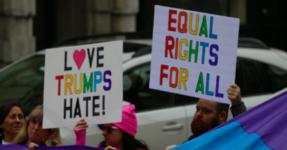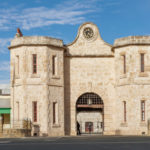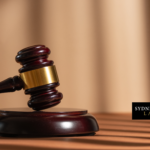Trump’s Mission to Strip LBGTQIA+ Rights, And How It Could Impact on Australia

It seemed outrageous for Trump to be elected as President in 2016 when he was up Democratic candidate Hillary Clinton, a person many saw as an inclusive candidate with a clear vision for the future, and the policies to go with it.
But it seems the American public was manipulated with populist rhetoric and hollow promises by an authoritarian peddler of hate and division, one intent on advancing the interests of himself and his wealthy friends, at the expense of the rest of the community.
Now, eight years later, America finds itself in a dire predicament. The country has elected a leader who not only vilifies ‘others’, whether that is women, minorities, or those who disagree with him, but he has been extremely open about his plans to strip civil liberties and human rights as soon as he is in office. The urgency of this situation cannot be overstated.
One of the main groups of people who will be directly affected by Trump’s hateful rhetoric, policies, and plans is the LGBTQIA+ community. The impact of these policies on their lives cannot be ignored, and it’s crucial that we stand in solidarity with them.
Trump’s Anti-LGBTQ Policies
Trump’s first administration focused an exorbitant amount of resources, time, and energy into erasing all previously-put protection for members of the LGBTQ community — something that equates to stripping humans of their basic rights of existing in a space without fear for their safety.
His first term involved attempting to eradicate the word or meaning of ‘transgender’ from ever existing, removing protections for transgender students in the education system and transgender individuals in their workplace, reducing funding for gender-affirming healthcare, and initiating hate speech that promoted violence and discrimination against those in the queer community.
Now that he has been re-elected, hundreds of thousands, if not millions, of Americans, are severely in jeopardy while simply asking for the bare minimum. He already promised pre-election that his administration would focus on revoking federal policies that prevent discrimination, allowing groups, individuals, employers, educators, and other positions of power to discriminate against LGBTQ individuals.
Plus, this new Trump administration will proactively distribute resources and funds to change federal law and take it out of the hands of the state — he will make nationwide discriminatory laws that put those in the LGBTQ community at risk in every aspect of their life, including housing, education, employment, federal programs, and healthcare.
Not only does this erase existing laws and rights that should be open to every single person living in the United States, but it attempts to eradicate an entire group, transgender people, from being able to identify and exist — with striking similarities to Hitler’s erasure of the Jewish population.
But how did the US get here? It was a long road that led to Trump somehow winning the first election, even after spewing hate speech, discriminatory rhetoric, admitting to sexual assault, and being an openly misogynistic, racist, and sexist man running for office.
In short, as soon as Trump was in the running for the first presidency, he made it well known to his supporters that he would do everything he could to oppose the Equality Act — a comprehensive civil rights bill that would provide nondiscrimination protections for LGBTQ people in employment, housing, and public accommodations — and block job protections for LGBTQ people.
Now, he has continued with what he said he would and plans to weaponise federal laws to discriminate against queer people.
Australian Anti-LGBTQ Policies Aren’t That Far Off Trump’s
One of the most concerning aspects is that a nation previously seen as one of the most powerful and influential countries can have a trickle-down effect on other progressive societies worldwide. Australia is not too far behind the United States when it comes to allowing violent rhetoric, letting hate crimes fall by the wayside, and avoiding establishing anti-discriminatory policies in their government that would criminalise hate crimes.
Just this September, the attorney general, Mark Dreyfus, attempted to pass the new hate crimes bill which would expand the current offence of urging or inciting violence and establish new offences regarding using force of violence against members of a group. The new offences would protect groups commonly discriminated against based on political opinion, nationality, gender identity, race, religion, or sexual orientation.
However, the close-minded government opted not to criminalise hate speech, ridicule, inciting hatred or violence, and serious contempt — all of which are common occurrences in modern Australian society that are directed at groups of individuals, compromising their safety in day-to-day life.
The Chief Executive of Equality Australia, an LGBTQ+ advocacy group, Anna Brown, stated that those who are a part of the queer community are constantly under threats from those who are inciting hate speech, spewing rhetoric that can spur violence, and vilifying these ‘groups of people’ who are attempting to coexist in an ever-changing world. It has been a proven fact that LGBTIQ+ communities ‘do not have sufficient protection under the law’, Brown said. The lack of urgency in passing a law criminalising hate speech further exacerbates this vulnerability, as it allows for the continued propagation of hate speech and the potential for it to escalate into violence.
The need for legislation prohibiting discrimination and disallowing hate speech is long overdue. It’s high time we ensure that everyone, regardless of their sexual orientation, identity, intersex status, religious beliefs, or disabilities, is protected under the law.
Gay-Related Hate Crimes in Australia’s Past – and Current
A clear example of just how dangerous a lack of accountability, lack of criminalisation of hate speech, group targeting, and anti-LGBTQ actions can severely harm vulnerable individuals is the gay-related hate crimes that have marred Australia’s past. These crimes include physical assaults, murder, verbal abuse, and discrimination in various settings. And just like how Trump was re-elected in a twist that we never thought was possible, violence in the queer community in Australia is not a thing of the past — it is an ever-present threat.
This past August, men from Victoria and ACT were targeted on dating apps, sexually assaulted and robbed, indicating that actions we thought were a thing of ‘old-school’ thinking might not have stopped. In fact, homophobia could be increasing in Australian society.
Discrimination against queer people and homophobia has actually increased in the last year, indicating that the worldwide effect of homophobia, vilification of the LGBTQ community, and discrimination against anyone different from the ‘normal’ has reached Australia. Justin Ellis, a University of Newcastle criminology professor, noted that the actions in Australia ‘have its origins in religious bigotry in the United States,’ showing how Trump’s new reign can have a serious influence on how Australians may think/act.
Furthermore, the increase in the rise of hate crimes can be attributed to the lack of urgency, organisation, and care from the police force across the country. The New South Wales Special Commission Inquiry was in charge of investigating suspected hate crime murders that plagued the state, with the final report only further highlighting the ineptitude and shortcomings of the NSW Police Force and their investigative efforts.
Unsolved Hate Crimes Show a Lack of Effort from Australian Police
Gay-related hate crimes and clear inadequacies from the Australian police force are not foreign to a country that is supposed to be inclusive, progressive, and ‘Westernised’. Similar to America — a country that Australia has much in common with, unfortunately, including colonisation of land, prejudice against ethnic groups, discrimination against minorities, and establishing laws that allow for hateful rhetoric — Australia has a history of gay-related hate crimes that lasted an extremely long period, something the country has yet to recover from.
The NSW Police Force admitted guilt when it came to making mistakes while investigating 30 unsolved deaths in the region spanning three decades. The police force didn’t even do their basic due diligence of re-checking names to ensure they identified the victims correctly, leading to false assessments by the NSW State coroner, Michael Barnes.
To make up for the egregious errors that tried to cover up the gay hate crimes in the 1970s to 1990s, NSW Police scrambled to put together a detective squad called Operation Parrabel to review 88 deaths that could be considered homophobic crimes.
But, this operation was just a facade to attempt to ‘solve’ the murders, as the operation had just six weeks to review all of the supposed deaths. A lack of urgency, paired with not enough time to investigate each murder, shows the lack of caring from the police force when it comes to distributing resources, time, and energy to solving this string of killings.
Furthermore, the initial mistakes made in the cases between the 70s and 90s can be attributed to homophobic police culture and clear mistakes— such as the misspelling of last names — that led to the dismissal of critical cases that could have led to answers.
Not only were errors made in the original inquests, but the lack of curiosity, interest, and care regarding the victims meant that numerous men who went missing or who were killed in NSW during these decades had their deaths ruled as suicides — despite clear evidence of a targeted attack, like the Johnson case.
Finally, despite apparent evidence when it comes to the victim, location of the body, manner of death, and patterns of the killings, the investigation still labelled some of the unsolved murders of gay men as only ‘possible’ or ‘probable’ hate crimes. Not only does this disrespect the victims, but it takes the onus off of the detectives to formulate an answer and put the case to bed. The ambiguity reflects the police’s thoughts on the crimes — they don’t really care enough.
Parallels Between the US and Australia
Despite strides made between the 1970s and now in NSW and Australia, hate crimes are still a ‘common occurrence throughout Australia’. 25.5% of LGBTIQ people experienced verbal abuse due to their sexuality or gender identity, with 8.7% receiving threats of physical violence.
Unfortunately, Australia is on a similar path to the United States — by ignoring hate crimes, avoiding writing legislation, and not correctly investigating or criminalising gay hate-related acts — the country basically stands by and allows discrimination to occur. In the United States today, anti-LGBTQ crimes based on sexual orientation and gender identity are on the rise, up an astonishing 8.6% from 2022.
In 2023, the Human Rights Campaign declared a state of emergency for those who are a part of the queer community in the United States — something that will only accelerate now that Trump is president. If Australia continues to emulate the US’ policies and cultural norms, we can only predict that our country will follow the same destructive path.






